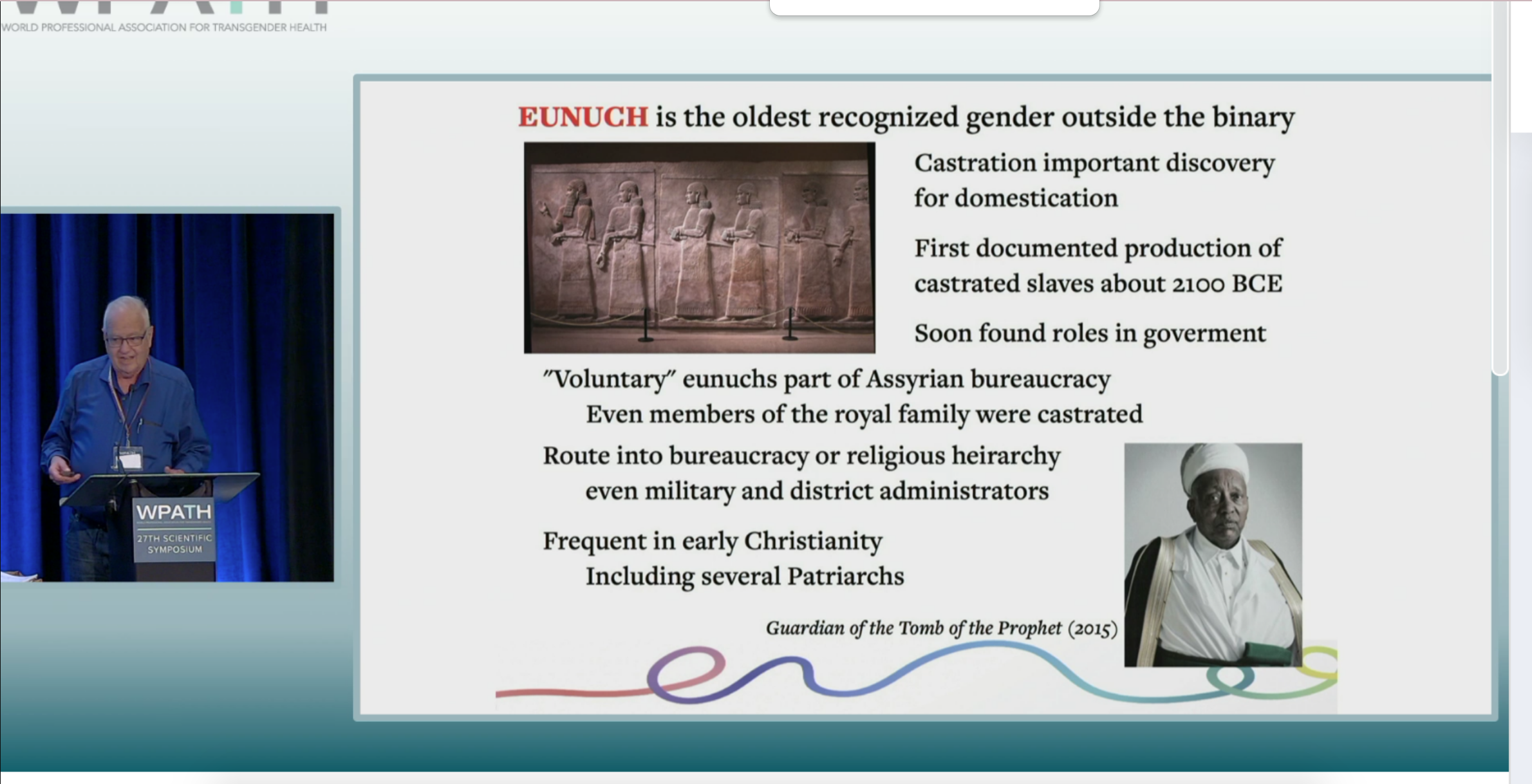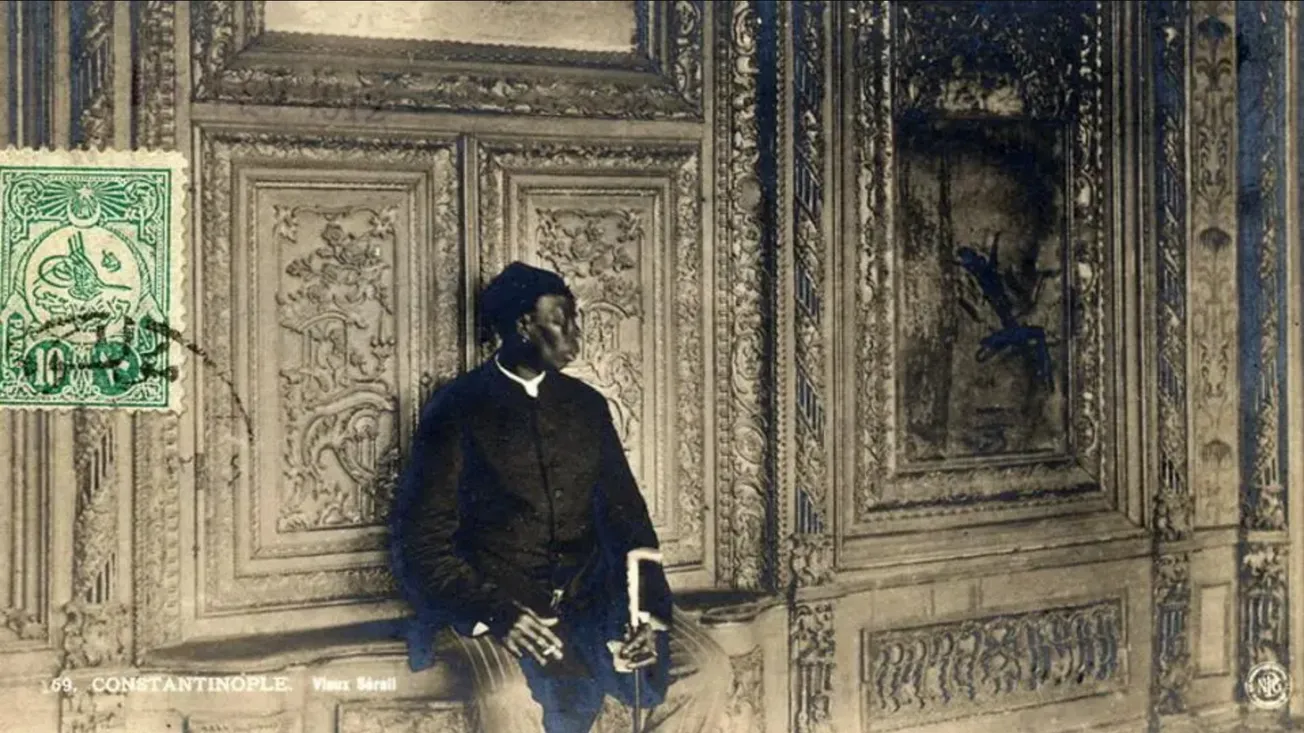Table of Contents
Michael Cook
mercatornet.com
Michael Cook is the editor of MercatorNet. He lives in Sydney, Australia.
The ever-expanding acronym LGBTQI+ has a new letter, E. That’s E for eunuch, the latest official gender identity. It comes stamped with the seal of approval of the world’s leading medical association for other-gendered folks.
For the first time the new edition of Standards of Care and Ethical Guidelines (SOC8) published by the World Professional Association for Transgender Health (WPATH) has included a chapter on care for eunuchs.
In a talk explaining this at a recent WPATH conference in Montreal, Dr Michael S. Irwig described eunuchs as “one of the most marginalized and stigmatized communities in any culture anywhere across the world”. His colleague, Dr Tom Johnson, estimated that there are 8,000 to 10,000 “self-identified voluntary eunuchs in North America today.” They claimed that there is a large online peer-support community for eunuchs which offers advice on chemical and surgical castration.
Together they recommended that doctors create a “welcoming environment” for men who have been castrated or who are thinking about it.
This is not the only startling news to emerge from WPATH, but it might be the most significant. (For news about 9-year-olds on puberty blockers, click here.) We are privileged to be present at the creation of an entirely new gender identity. It’s like watching the Mexican volcano Parícutin as it emerged from a cornfield overnight.
Here’s the gender identity playbook for official recognition. We’ve applied it to eunuchs, but it would work for any of the dozens of gender identities out there.

First, prove that eunuchs have always existed. The supporters of the new identity say that it has existed for thousands of years. Dr Johnson is deeply versed in the history of eunuchs. It is the “the oldest recognized gender outside the binary,” he told the WPATH conference. Back in 2014 he even recommended that the Islamic State should create a cadre of castrated bureaucrats to ensure its survival in an article that he co-authored in The Washington Post.
It is an academic question as to which is more barbaric: to behead (murder) or to castrate (mutilate). But of the two choices, if Islamic State continues along its current path, it is likely to be remembered like the Vandals – that is, as murderous marauders who get a brief mention in high school history classes.
Second, prove that this is a really big deal. In the age of the internet, this is relatively easy. Although, as Dr Johnson was honest enough to admit in his talk at the Montreal conference, there are only a few thousand voluntary eunuchs in the US and Canada, the WPATH guidelines cites numbers which are much higher. There are 130,000 registered members of an on-line discussion forum; close to 220,000 posts; instructions on self-castration which have been read one million times; annual eunuch conferences since 2001 in Minneapolis. These figures are essentially irrelevant to the existence of eunuchs as a gender identity, but big numbers are always impressive.
Three, prove that eunuchs suffer from minority stress. The chapter in SOC8 describes eunuchs as a “distinct gender identity” which battles with stigma and negative stereotypes.
Fourth, prove that eunuchs need gender-affirming medical care “to gain comfort with their gendered self”. Hence, the expertise of transgender specialists is necessary to keep them from self-harm. “We recommend health care professionals consider medical intervention, surgical intervention, or both for eunuch individuals,” say the guidelines, “when there is a high risk that withholding treatment will cause individuals harm through self-surgery, surgery by unqualified practitioners, or unsupervised use of medications that affect hormones.”
Fifth, prove that doctors do not act unethically if they castrate their patients. The mere presence of a chapter on eunuchs in the WPATH standards is a giant step forward towards this goal. WPATH’s approval gives doctors a fig leaf of legal protection and paves the way for insurance coverage for their patients. As Dr Johnson told the Montreal conference:
… having this in the SOC is so huge, because it’s now in the official guidelines. And a lot of doctors and surgeons, you know, they don’t want to be seen as, you know, being rogue, and doing things that are—may get them into trouble, or that they may get their licenses pulled on. So now that there’s a chapter in the SOC8 saying, here’s this population, here are the services that they’re looking for, this is an appropriate, you know, management— it helps alleviate some of their concerns, I think.
Sixth, prove that eunuchs are ordinary folks, just differently gendered. They could be your brother or cousin or workmate. But because eunuchs have historically been a stigmatised and marginalised group, they are invisible. According to Dr Johnson, they seem to be better educated than the rest of the population. About 30 percent of Americans over 25 have a bachelor’s degree, compared to 48 percent of eunuchs. And 3 percent have PhDs, compared to 8 percent of the eunuchs.
Seventh, prove that eunuchs are reasonably well understood by contemporary medicine. Dr Johnson says that there are three types of people who seek voluntary castration. Men with extreme gender dysphoria are described in the WPATH standards. Men with body integrity dysphoria are described in the International Classification of Diseases for Mortality and Morbidity Statistics, number 6C21. The third are fetishists, mostly religious – and they are not covered by SOC8. It is important, however, to avoid discussing the possibility that wanting to be a eunuch might be a psychiatric problem. If that were true, treatment with hormones and surgery would be inappropriate and endocrinologists and urologists might be put out of work.
The WPATH standards assume that voluntary eunuchs are always adults. But they hold out some hope that children and adolescents could someday be included if there were adequate data. The document states that:
Like other gender diverse individuals, eunuch individuals may be aware of their identity in childhood or adolescence. Due to the lack of research into the treatment of children who may identify as eunuchs, we refrain from making specific suggestions.
The seven steps in the gender playbook can easily be applied to other gender-diverse people to help them to reach, as the WPATH guidelines state, “lasting personal comfort with their gendered selves with the aim of optimizing their overall physical health, psychological well-being, and self-fulfillment.”
Eventually chapters could be added on zoophiles (people who are attracted to animals) and paedophiles. These communities are even more marginalised and stigmatised than eunuchs. Of course, it may take time. The first version of the WPATH Standards of Care was published in 1979; eunuchs had to wait 43 years to be recognised. Zoophiles and paedophiles need to be patient. But their day will come. They have the playbook.






